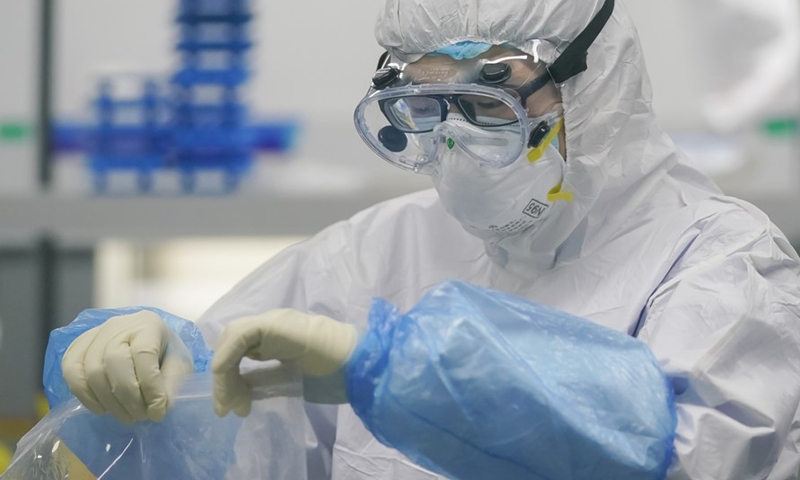Chinese, British scientists argue why COVID-19 can only come from nature, impossible to be man-made

A staff member handles nucleic acid testing samples at a novel coronavirus detection lab in Wuhan, central China's Hubei Province, Feb 22, 2020. Photo:Xinhua
The article titled "On the origin of SARS-CoV-2—The blind watchmaker argument," was published in Science China Life Sciences magazine and co-authored by scientists with expertise in biology, life science, animal research and genetics from leading Chinese universities, including the Peking University, Sun Yat-sen University, Fudan University, Capital Medical University and researchers from the Chinese Academy of Sciences.
One of the authors, Alice C. Hughes, is a British scholar now working in the Landscape Ecology Group of the Center for Integrative Conservation in Xishuangbanna Tropical Botanical Garden with the Chinese Academy of Sciences.
Wu Chung-I, the first author from the State Key Laboratory of Biocontrol of the School of Life Sciences with Sun Yat-sen University in Guangzhou, South China's Guangdong Province, said in comparison with SARS-CoV of 2003, SARS-CoV-2 is extremely well adapted to human populations and its shift in adaptability from the animal host to humans must have been even more extensive.
Following the blind watchmaker argument, such a shift in adaptability can only happen prior to the onset of the current pandemic and with the aid of a step-by-step selection. In this view, SARS-CoV-2 could not have possibly evolved in an animal market in a big city and even less likely in a laboratory, the author said.
There have been many calls recently for the continued investigations of SARS-CoV-2 origins from both non-academic circles and academia. The author said this piece is a commentary on biological origin based strictly on scientific principles.
The origin of any living organisms is often a prolonged process of evolution consisting many steps of refinement. Hence, evolution usually stretches over a long evolutionary time scale and sometimes over a large geographical area.
Therefore, the question should be about how, when and where SARS-CoV-2 evolved to become so perfectly adapted to the human condition. The starting point may be assumed to be a viral strain that is well adapted to some wild animals. Hence, there should be an adaptive shift from animal hosts to humans, the paper said.
It is a widely held view in evolution theory that species evolve for no particular purpose. If nature were a clockmaker, it would be a blind clockmaker. A perfectly adapted species would not be created at once, but would accumulate small changes over long periods of time and undergo a large number of random mutations, according to the paper.
"Novel coronavirus, as a 'perfect' virus, must be the product of natural evolution. Because even the best human scientists can't 'make' a perfect human virus," the author told the Xinhua News Agency, adding that "it is like the most skilled and experienced mobile phone manufacturers, it is impossible to design the world's most popular mobile phone at one time. The 'perfect' product must be based on market testing and repeated polishing."
We inferred that prior to the COVID-19 outbreak, the viruses must have undergone repeated inter-infections in both wild animals and humans. In the process, the viruses gradually accumulated mutations that could be adapted to humans. In the process of invading people, the virus repeatedly failed and left a "trace" until it evolved into the state that it is today: extremely adapted to spread among people, Wu said.
Some existing studies have also proved this point. For example, mice originally could not be infected with the novel coronavirus, but scientists used artificial selection method to find the novel coronavirus strains that can infect mice. However, even so, the artificially selected strains did not caused a large outbreak in the mice population.
Global Times

